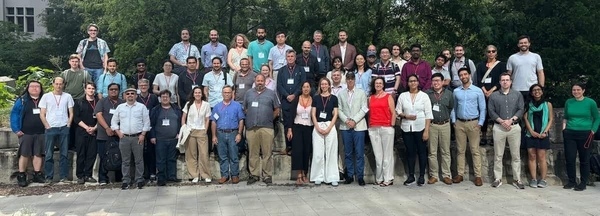
Experts from around the globe gathered at the University of Chicago this week to push the boundaries on using artificial intelligence, machine learning, and other computer modeling innovations to tackle the world’s biggest challenges.
The workshop Frontiers of Computational Reaction Prediction ran from July 15-17, bringing together researchers from different fields to promote fundamental research on advanced computational methods. It was the initial event hosted by CECAM-US-CENTRAL, the first North American node for the global research consortium Centre Européen de Calcul Atomique et Moléculaire (CECAM).
UChicago Pritzker School of Molecular Engineering Prof. Andrew Ferguson, the director of the new node, said the time was right both for the event and for CECAM’s commitment to the North American research community.
“We’re at a point in history where high-performance computation, machine learning, and AI are powerful and pervasive tools for molecular and materials discovery that are being used for everything from finding candidates for sustainable battery materials to sorting through trillions of potentially lifesaving drugs and therapies,” Ferguson said. “We are delighted to host as our inaugural event of the CECAM-US-CENTRAL node an exciting workshop convening some of the foremost experts in the world on the use of computational and AI tools to understand, predict, and control chemical reactions and reaction networks. CECAM workshops like this provide a unique environment for participants to share cutting-edge results, collaboratively define new directions for the field, and spur new international and interdisciplinary collaborations.”
The North American node was formed in November 2023 with the goal of breaking down barriers between U.S. and European research institutions and presenting new opportunities for bilateral cooperation.
“The launch of this U.S.-based CECAM node is really the culmination of efforts that started almost five years ago,” said PME Prof. Juan de Pablo, UChicago’s Executive Vice President of Science, Innovation, National Laboratories, and Global Initiatives. “At the time, many of us within the U.S. scientific community were keenly aware of the tremendous impact of CECAM’s efforts to advance research. I am delighted to see the University of Chicago lead the expansion of this impactful network to the United States thereby extending the benefits of engagement with CECAM to students in the U.S. and the broader scientific community”.
This new node brings together expertise from across UChicago and partner groups Northwestern University, the University of Illinois at Urbana-Champaign, the University of Wisconsin-Madison and the University of Notre Dame.
Speaking about the new node, Jeffrey F. Rhoads, Vice President for Research at the University of Notre Dame said, “We are thrilled to be a founding member of this new node. Computational modeling and simulation has a long and esteemed history here in South Bend. Being able to join our colleagues to not only bring CECAM to the United States, but more importantly, to the Midwest, helps us to build on this exceptional tradition of collaboration and excellence.”
“Having a CECAM node in the U.S. will be an exceptional asset to North American researchers by strengthening ties with top molecular modeling groups overseas while providing a new and well-respected mechanism for hosting internationally attended workshops on molecular modeling within the United States,” said University of Illinois Urbana-Champaign Asst. Prof. Nick Jackson, one of the workshop’s co-organizers.
The talks during the three-day workshop covered topics ranging from polymer design to drug discovery to using efficient quantum chemistry methods to explore chemical reactions.
“Reaction modeling is at an inflection point from being a descriptive approach for rationalizing trends to being an authentically predictive set of methods,” said University of Notre Dame’s Brett M. Savoie, Coyle Mission Collegiate Professor of Chemical and Biomolecular Engineering and one of the workshop’s co-organizers. “The timing couldn't be better for this workshop focused on problems, capabilities, and what changes machine learning is bringing to reaction prediction.”
CECAM is a European network, based in Switzerland, which promotes fundamental research on advanced computational methods and their application to important problems in fields including biology, chemistry, engineering and physics, and beyond. To fulfill CECAM’s mission, 17 nodes of scientific activity operate across Europe and in Israel. CECAM-US-CENTRAL is the 18th node and is the first based outside of the European research landscape.